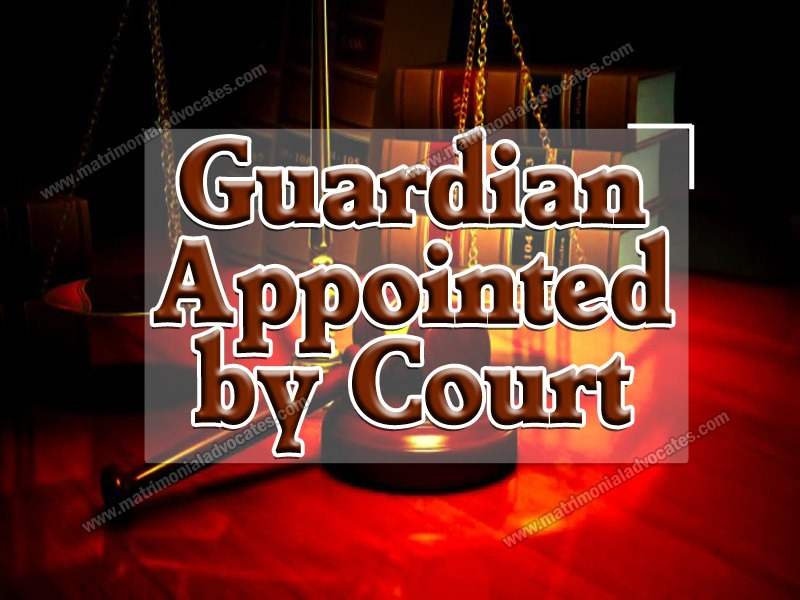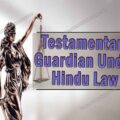
“Guardian” means a person having the care of the person of a minor or of his property, or of both is person and property. The guardian occupies a fiduciary position and is bound, for instance, to manage the property of the minor with the same here and prudence with which he would manage own property.
Appointment can be made either by the Courts during family proceedings, if it is considered necessary for the child’s welfare, or privately by any parent with parental responsibility.
The guardian appointed by court is also known as the certified guardian. The present article discusses about the concept of guardian appointed by the court along with the procedure laid down in the Guardians and Wards Act, 1890 related to the guardian appointed or declared by court.
GUARDIAN APPOINTED BY COURT
If the court is satisfied that it is for the Welfare of minor that an order should be made appointing a Guardian of his person or property or both, the court may make an order under the Guardians and Wards Act, 1890 appointing a guardian. In appointing or declaring a person as the Guardian of a minor Welfare of the minor shall be the Paramount consideration.
The Court here refers to the District Court having jurisdiction to entertain an application under this Act for an order appointing or declaring a person to be a guardian; and includes a High Court in the exercise of its ordinary original civil jurisdiction.
Section 7 of the Guardian and Wards Act, 1890 states that the Court has power to order as guardianship:
1) Where the Court is satisfied that it is for the welfare of a minor that an order should be made—
(a) Appointing a guardian of his person or property, or both, or
(b) Declaring a person to be such a guardian, the Court may make an order accordingly.
2) An order under this section shall imply the removal of any guardian who has not been appointed by will or other instrument or appointed or declared by the Court.
PERSON ELIGIBLE TO BE APPOINTED AS GUARDIAN
Such a person can apply for appointment as guardian:
i) Any person who desirous
of being or claiming to be the guardian of theminor, or
ii) any relative or friend
of the minor, or
iii) The Collector of the District or other local area in which
a) the minor ordinarily resides,
b) The minor holds property, or
iv) if the minor belongs to a class, the collector who has authority with
respect to that class.
MATTERS TO BE CONSIDERED BY THE COURT
Section 17 of the Guardian and Wards act, 1890 deals with the matter to be considered by court while appointing the guardian:
- In appointing or declaring the guardian of a minor, the Court shall, subject to the provisions of this section, be guided by what, consistently with the law to which the minor is subject, appears in the circumstances to be for the welfare of the minor.
- In considering what will be for the welfare of the minor, the Court shall have regard to the age, sex and religion of the minor, the character and capacity of the proposed guardian and his nearness of kin to the minor, the wishes, if any, of a deceased parent, and any existing or previous relations of the proposed guardian with the minor or his property.
- If minor is old enough to form an intelligent preference, the Court may consider that preference.
- The Court shall not appoint or declare any person to be a guardian against his will.
POWERS OF THE GUARDIAN APPOINTED BY COURT
Powers of the guardian appointed by court are same as that of the natural guardian.
The guardian appointed by court , subject to the provisions of this section, to do all acts which are necessary or reasonable and proper for the benefit of the minor or for the realization, protection or benefit of the minor’s estate; but the guardian can in no case bind the minor by a personal covenant.
Limitation on power
The natural guardian shall not, without the previous permission of the court —
- mortgage or charge, or transfer by sale, gift, exchange or otherwise any part of the immovable property of the minor or
- Lease any part of such property for a term exceeding five years or for a term extending more than one year beyond the date on which the minor will attain majority.
Variation of powers of guardian of
property appointed or declared by the Court:
- Where a guardian of the property of a ward has been appointed or declared by the Court and such guardian is not the Collector, the Court may, from time to time, by order, define, restrict or extend his powers with respect to the property of the ward in such manner and to such extent as it may consider to be for the advantage of the ward and consistent with the law to which the ward is subject.
REMOVAL OF GUARDIAN APPOINTED BY COURT
The Court may, on the application of any person interested, or of its own motion, remove a guardian appointed or declared by the Courtfor any of the following causes, namely:—
- for abuse of his trust;
- for continued failure to perform the duties of his trust;
- for incapacity to perform the duties of his trust;
- for ill-treatment, or neglect to take proper care, of his ward;
- for contumacious disregard of any provision of this Act or of any order of the Court;
- for conviction of an offence implying, in the opinion of the Court, a defect of character which unfits him to be the guardian of his ward;
- for having an interest adverse to the faithful performance of his duties;
- for ceasing to reside within the local limits of the jurisdiction of the Court;
- In the case of a guardian of the property, for bankruptcy or insolvency.
DISCHARGE OF GUARDIAN APPOINTED BY COURT
Section 40 of the Guardians and Wards Act, 1890 enumerates these grounds for discharge of guardianship:
- If a guardian appointed or declared by the Court desires to resign his office, he may apply to the Court to be discharged.
- If the Court finds that there is sufficient reason for the application, it shall discharge him, and if the guardian making the application is the Collector and the State Government approves of his applying to be discharged, the Court shall in any case discharge him.
CESSATION OF THE GUARDIANSHIP
The power of the guardian of the person and property ceases on these grounds:
- By death, removal or discharge of the guardian
- By the Court of Wards assuming superintendence of the person of the ward;
- By the ward ceasing to be a minor.
Appointment of successor to guardian dead, discharged or removed
Section 42 of the Guardian and wards acts lays down the rule when the successor to the guardian dead, discharged or removed can be appointed, it states that:
“When a guardian appointed or declared by the Court is discharged, or, under the law to which the ward is subject, ceases to be entitled to act, or when any such guardian or a guardian appointed by Will or other instrument is removed or dies, the Court, of its own motion or on application under Chapter II, may, if the ward is still a minor, appoint or declare another guardian of his person or property, or both, as the case may be.”
IMPORTANT CASE LAWS
Bimla Devi vsSubhas Chandra Yadav AIR 1992 Pat 76
In this case the court has done the interpretation of the word “welfare” the court was of the view that” it is well settled that the word “welfare” must be taken in its widest sense. The moral and ethical welfare of the child must also weigh with the Court as well as its physical well being.”
BholaNathvsSharda Devi 1954 (2) BLJR 243
It was held in this case under the Guardians and Wards Act, 1890, the most important consideration which must always weigh with the Court in making orders for the appointment of guardians of minors is the welfare of the minor.
CONCLUSION
Guardianship implies the right to take decisions on behalf of the minor, and to administer the property of the minor, if any, till he/she attains majority.The Guardians and Wards Act, 1890 is a secular law regulating questions of guardianship for all children in India.
Under the Guardians and Wards Act, 1890 the court when satisfies that it is required for the welfare of the minor may appoint a guardian of his person or his property. Coming to the powers of the Guardian declared by court, there are a very few acts which a guardian appointed by court can perform without the prior permission of the court. In the ultimate analysis his powers are co-extensive with the powers of the sovereign and he may do all those things (though with the permission of the court) which the sovereign has power to do. A guardian appointed by court from the date of his appointment is under the supervision, guidance and control of the court.
Since the foremost factor while appointing a guardian is the welfare of the minor hence the guardianship can be ended in a situation when either the guardian has witnessed some unforeseeable circumstance or the court feels that the guardianship was not in the welfare of the child.





